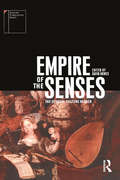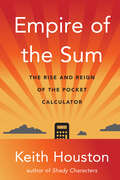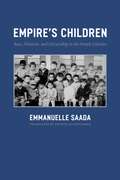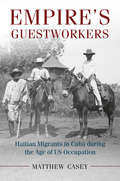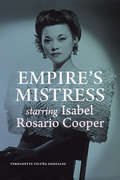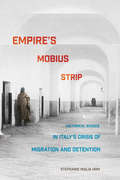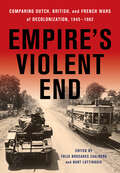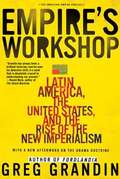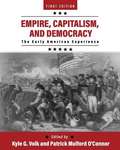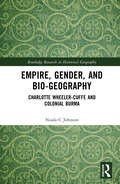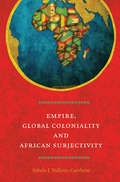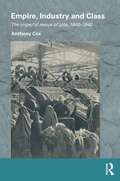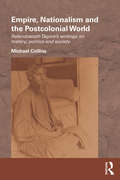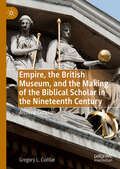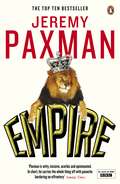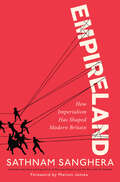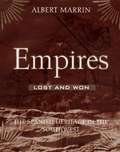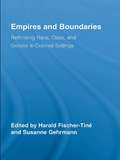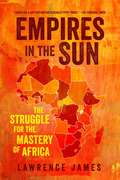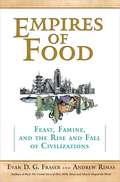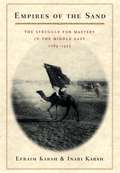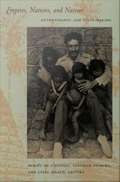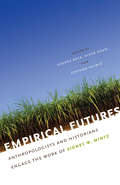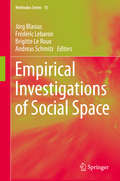- Table View
- List View
Empire of the Senses: The Sensual Culture Reader (Sensory Formations)
by David HowesWith groundbreaking contributions by Marshall McLuhan, Oliver Sacks, Italo Calvino and Alain Corbin, among others, Empire of the Senses overturns linguistic and textual models of interpretation and places sensory experience at the forefront of cultural analysis. The senses are gateways of knowledge, instruments of power, sources of pleasure and pain - and they are subject to dramatically different constructions in different societies and periods. Empire of the Senses charts the new terrains opened up by the sensual revolution in scholarship, as it takes the reader into the sensory worlds of the medieval witch and the postmodern mall, a Japanese tea ceremony and a Boston shelter for the homeless. This compelling revisioning of history and cultural studies sparkles with wit and insight and is destined to become a landmark in the field.
Empire of the Sum: The Rise And Reign Of The Pocket Calculator
by Keith HoustonThe hidden history of the pocket calculator—a device that ushered in modern mathematics, helped build the atomic bomb, and went with us to the moon—and the mathematicians, designers, and inventors who brought it to life. Starting with hands, abacus, and slide rule, humans have always reached for tools to simplify math. Pocket-sized calculators ushered in modern mathematics, helped build the atomic bomb, took us to the bottom of the ocean, and accompanied us to the moon. The pocket calculator changed our world, until it was supplanted by more modern devices that, in a cruel twist of irony, it helped to create. The calculator is dead; long live the calculator. In this witty mathematic and social history, Keith Houston transports readers from the nascent economies of the ancient world to World War II, where a Jewish engineer calculated for his life at Buchenwald, and into the technological arms race that led to the first affordable electronic pocket calculators. At every turn, Houston is a scholarly, affable guide to this global history of invention. Empire of the Sum will appeal to math lovers, history buffs, and anyone seeking to understand our trajectory to the computer age.
Empire's Children
by Ellen BoucherBetween 1869 and 1967, government-funded British charities sent nearly 100,000 British children to start new lives in the settler empire. This pioneering study tells the story of the rise and fall of child emigration to Canada, Australia, New Zealand, and Southern Rhodesia. In the mid-Victorian period, the book reveals, the concept of a global British race had a profound impact on the practice of charity work, the evolution of child welfare, and the experiences of poor children. During the twentieth century, however, rising nationalism in the dominions, alongside the emergence of new, psychological theories of child welfare, eroded faith in the 'British world' and brought child emigration into question. Combining archival sources with original oral histories, Empire's Children not only explores the powerful influence of empire on child-centered social policy, it also uncovers how the lives of ordinary children and families were forever transformed by imperial forces and settler nationalism.
Empire's Children: Race, Filiation, and Citizenship in the French Colonies
by Arthur Goldhammer Emmanuelle SaadaEurope's imperial projects were often predicated on a series of legal and scientific distinctions that were frequently challenged by the reality of social and sexual interactions between the colonized and the colonizers. When Emmanuelle Saada discovered a 1928 decree defining the status of persons of mixed parentage born in French Indochina - the metis - she found not only a remarkable artifact of colonial rule, but a legal bombshell that introduced race into French law for the first time. The decree was the culmination of a decades-long effort to resolve the metis question: the educational, social, and civil issues surrounding the mixed population. Operating at the intersection of history, anthropology, and law, Empire's Children reveals the unacknowledged but central role of race in the definition of French nationality. Through extensive archival work in both France and Vietnam, and a close reading of primary and secondary material from the Pacific islands and sub-Saharan and North Africa, Saada has created in Empire's Children an original and compelling perspective on colonialism, law, race, and culture from the end of the nineteenth century until decolonization.
Empire's Guestworkers: Haitian Migrants in Cuba during the Age of US Occupation. (Afro-Latin America)
by Matthew CaseyInnovative study reconstructs Haitian guestworkers' lived experiences as they moved among the rural and urban areas of Haiti, and the sugar plantations, coffee farms, and cities of eastern Cuba. It offers an unprecedented glimpse into the daily workings of empire, labor, and political economy in Haiti and Cuba.
Empire's Mistress, Starring Isabel Rosario Cooper
by Vernadette Vicuña GonzalezIn Empire's Mistress Vernadette Vicuña Gonzalez follows the life of Filipina vaudeville and film actress Isabel Rosario Cooper, who was the mistress of General Douglas MacArthur. If mentioned at all, their relationship exists only as a salacious footnote in MacArthur's biography—a failed love affair between a venerated war hero and a young woman of Filipino and American heritage. Following Cooper from the Philippines to Washington, D.C. to Hollywood, where she died penniless, Gonzalez frames her not as a tragic heroine, but as someone caught within the violent histories of U.S. imperialism. In this way, Gonzalez uses Cooper's life as a means to explore the contours of empire as experienced on the scale of personal relationships. Along the way, Gonzalez fills in the archival gaps of Cooper's life with speculative fictional interludes that both unsettle the authority of “official” archives and dislodge the established one-dimensional characterizations of her. By presenting Cooper as a complex historical subject who lived at the crossroads of American colonialism in the Philippines, Gonzalez demonstrates how intimacy and love are woven into the infrastructure of empire.
Empire's Mobius Strip: Historical Echoes in Italy's Crisis of Migration and Detention
by Stephanie Malia HomItaly's current crisis of Mediterranean migration and detention has its roots in early twentieth century imperial ambitions. Empire's Mobius Strip investigates how mobile populations were perceived to be major threats to Italian colonization, and how the state's historical mechanisms of control have resurfaced, with greater force, in today's refugee crisis.What is at stake in Empire's Mobius Strip is a deeper understanding of the forces driving those who move by choice and those who are moved. Stephanie Malia Hom focuses on Libya, considered Italy's most valuable colony, both politically and economically. Often perceived as the least of the great powers, Italian imperialism has been framed as something of "colonialism lite." But Italian colonizers carried out genocide between 1929–33, targeting nomadic Bedouin and marching almost 100,000 of them across the desert, incarcerating them in camps where more than half who entered died, simply because the Italians considered their way of life suspect. There are uncanny echoes with the situation of the Roma and migrants today. Hom explores three sites, in novella-like essays, where Italy's colonial past touches down in the present: the island, the camp, and the village.Empire's Mobius Strip brings into relief Italy's shifting constellations of mobility and empire, giving them space to surface, submerge, stretch out across time, and fold back on themselves like a Mobius strip. It deftly shows that mobility forges lasting connections between colonial imperialism and neoliberal empire, establishing Italy as a key site for the study of imperial formations in Europe and the Mediterranean.
Empire's Violent End: Comparing Dutch, British, and French Wars of Decolonization, 1945–1962
by Thijs Brocades Zaalberg Bart LuttikhuisIn Empire's Violent End, Thijs Brocades Zaalberg and Bart Luttikhuis, along with expert contributors, present comparative research focused specifically on excessive violence in Indonesia, Algeria, Vietnam, Malaysia, Kenya, and other areas during the wars of decolonization. In the last two decades, there have been heated public and scholarly debates in France, the United Kingdom, and the Netherlands on the violent end of empire. Nevertheless, the broader comparative investigations into colonial counterinsurgency tend to leave atrocities such as torture, execution, and rape in the margins. The editors describe how such comparisons mostly focus on the differences by engaging in "guilt ranking." Moreover, the dramas that have unfolded in Algeria and Kenya tend to overshadow similar violent events in Indonesia, the very first nation to declare independence directly after World War II. Empire's Violent End is the first book to place the Dutch-Indonesian case at the heart of a comparison with focused, thematic analysis on a diverse range of topics to demonstrate that despite variation in scale, combat intensity, and international dynamics, there were more similarities than differences in the ways colonial powers used extreme forms of violence. By delving into the causes and nature of the abuse, Brocades Zaalberg and Luttikhuis conclude that all cases involved some form of institutionalized impunity, which enabled the type of situation in which the forces in the service of the colonial rulers were able to use extreme violence.
Empire's Workshop: Latin America, the United States, and the Rise of the New Imperialism
by Greg GrandinIn a brilliant excavation of long-obscured history, Empire's Workshop shows how Latin America has functioned as a proving ground for American strategies and tactics overseas.
Empire, Capitalism, And Democracy: The Early American Experience
by Patrick O'Connor Kyle VolkEmpire, Capitalism, and Democracy: The Early American Experience documents the history of the United States from the opening of the Atlantic World to the post-Civil War era. The primary sources included were created by women and men who lived during this time and illustrate three interdependent forces that animated the history of early America: empire, capitalism, and democracy. <p><p> Part I of the anthology explores the origins of European contact with America, "new world" civilizations, and the Atlantic slave trade. In Part II, students read sources that address American independence from British rule, early ideas of liberty and equality, the creation of the U.S. Constitution, and the first years of American government. The final part speaks to key issues that divided Americans in the nineteenth century, including market revolution, slavery, western expansion, and ideas of freedom and democracy after the Civil War. <p> With accessible introductions to each primary source and insightful questions to guide students' reading, Empire, Capitalism, and Democracy is an ideal collection for foundational courses in U.S. history.
Empire, Gender, and Bio-geography: Charlotte Wheeler-Cuffe and Colonial Burma (Routledge Research in Historical Geography)
by Nuala C JohnsonThis book explores the relationships between empire, natural history, and gender in the production of geographical knowledge and its translation between colonial Burma and Britain. Focusing on the work of the plant collector, botanical illustrator, and naturalist, Charlotte Wheeler-Cuffe, this book illustrates how natural history was practised and produced by a woman working in the tropics from 1897 to 1921. Drawing on the extensive and under-studied archive of private and official correspondence, diaries, sketchbooks, photographs, paintings, and plant lists of Wheeler-Cuffe, this book advances our conceptual understanding of the 'invisible’ historical geographies underpinning scientific knowledge production, by focusing on the role of a female actor in the complex gendered setting of colonial Burma. Using a bio-geographical approach, this analysis reconceptualises female agency beyond authorship and publication, and stresses how Wheeler-Cuffe represents an instantiation of the occluded contribution of women to the historiography of natural history. This book highlights Wheeler-Cuffe’s production of scientific knowledge about Burma in the context of her relationship, as a white Western woman, with local, indigenous actors and details her practice of fieldwork and its embodied geographies in different parts of Burma, while she maintained the domestic superstructure of a colonial wife. This book will be of interest to advance-level students and researchers in historical and cultural geography; the history of science; feminist geography; women and natural history; colonial Burma and imperialism; and botanical art and illustration.
Empire, Global Coloniality and African Subjectivity
by Sabelo J. Ndlovu-GatsheniGlobal imperial designs, which have been in place since conquest by western powers, did not suddenly evaporate after decolonization. Global coloniality as a leitmotif of the empire became the order of the day, with its invisible technologies of subjugation continuing to reproduce Africa's subaltern position, a position characterized by perceived deficits ranging from a lack of civilization, a lack of writing and a lack of history to a lack of development, a lack of human rights and a lack of democracy. The author's sharply critical perspective reveals how this epistemology of alterity has kept Africa ensnared within colonial matrices of power, serving to justify external interventions in African affairs, including the interference with liberation struggles and disregard for African positions. Evaluating the quality of African responses and available options, the author opens up a new horizon that includes cognitive justice and new humanism.
Empire, Industry and Class: The Imperial Nexus of Jute, 1840-1940 (Routledge/Edinburgh South Asian Studies Series)
by Anthony CoxPresenting a new approach towards the social history of working classes in the imperial context, this book looks at the formation of working classes in Scotland and Bengal. It analyses the trajectory of labour market formation, labour supervision, cultures of labour and class formation between two regional economies – one in an imperial country and the other in a colonial one. The book examines the everyday lives of the jute workers of the imperial nexus, and the impact of the ‘Dundee School’ of Scottish mechanics, engineers and managers who ran the Calcutta jute industry. It goes on to challenge existing theories of imperialism, class formation and class struggle – particularly those that underline the exceptional nature of the Indian experience of industrialization - and demonstrates how and why Empire was able to provide an opportunity to test and perfect ways of controlling the lower classes of Dundee. These historical debates have a continued relevance as we observe the impact of globalization and rapid industrialization in the so-called developing world and the accompanying changes in many areas of the developed world marked by de-industrialization. The book is of use to scholars of imperial history, labour history, British history and South Asian history.
Empire, Nationalism and the Postcolonial World: Rabindranath Tagore's Writings on History, Politics and Society (Routledge/Edinburgh South Asian Studies Series)
by Michael CollinsBy presenting a new interpretation of Rabindranath Tagore’s English language writings, this book places the work of India’s greatest Nobel Prize winner and cultural icon in the context of imperial history and thereby bridges the gap between Tagore studies and imperial/postcolonial historiography. Using detailed archival research, the book charts the origins of Tagore’s ideas in Indian religious traditions and discusses the impact of early Indian nationalism on Tagore’s thinking. It offers a new interpretation of Tagore’s complex debates with Gandhi about the colonial encounter, Tagore’s provocative analysis of the impact of British imperialism in India and his questioning of nationalism as a pathway to authentic postcolonial freedom. The book also demonstrates how the man and his ideas were received and interpreted in Britain during his lifetime and how they have been sometimes misrepresented by nationalist historians and postcolonial theorists after Tagore’s death. An alternative interpretation based on an intellectual history approach, this book places Tagore’s sense of agency, his ideas and intentions within a broader historical framework. Offering an exciting critique of postcolonial theory from a historical perspective, it is a timely contribution in the wake of the 150th anniversary of Tagore's birth in 2011.
Empire, the British Museum, and the Making of the Biblical Scholar in the Nineteenth Century: Archival Criticism
by Gregory L. CuéllarSince the modern period, the field of biblical studies has relied upon libraries, museums, and archives for its evidentiary and credentialing needs. Yet, absent in biblical scholarship is a thorough and critical examination of the instrumentality of the discipline’s master archives for elite power structures. Addressing this gap in biblical scholarship lies central to this book. Interrogated here is a premier repository or master archive of the discipline: the British Museum. Using an assemblage of critical theories from archival discourse to postcolonial studies, space theory to governmentality studies, the focal point of this book is at the intersections of the Museum’s rise to scientific prominence, the British Empire, and the conferring of scientific authority to modern biblical critics in the nineteenth century. Gregory L. Cuéllar initiates a season of historicization of the master archives of biblical studies and archival criticism.
Empire: What Ruling the World Did to the British
by Jeremy PaxmanFrom the bestselling author of The English comes Empire, Jeremy Paxman's history of the British Empire accompanied by a flagship 5-part BBC TV series, for readers of Simon Schama and Andrew Marr.The influence of the British Empire is everywhere, from the very existence of the United Kingdom to the ethnic composition of our cities. It affects everything, from Prime Ministers' decisions to send troops to war to the adventurers we admire. From the sports we think we're good at to the architecture of our buildings; the way we travel to the way we trade; the hopeless losers we will on, and the food we hunger for, the empire is never very far away.In this acute and witty analysis, Jeremy Paxman goes to the very heart of empire. As he describes the selection process for colonial officers ('intended to weed out the cad, the feeble and the too clever') the importance of sport, the sweating domestic life of the colonial officer's wife ('the challenge with cooking meat was "to grasp the fleeting moment between toughness and putrefaction when the joint may possibly prove eatable"') and the crazed end for General Gordon of Khartoum, Paxman brings brilliantly to life the tragedy and comedy of Empire and reveals its profound and lasting effect on our nation and ourselves.'Paxman is witty, incisive, acerbic and opinionated . . . In short, he carries the whole thing off with panache bordering on effrontery' Piers Brendon, Sunday Times 'Paxman is a magnificent historian, and Empire may be remembered as his finest work' Independent on SundayJeremy Paxman was born in Yorkshire and educated at Cambridge. He is an award-winning journalist who spent ten years reporting from overseas, notably for Panorama. He is the author of five books including The English. He is the presenter of Newsnight and University Challenge and has presented BBC documentaries on various subjects including Victorian art and Wilfred Owen.
Empireland: How Imperialism Has Shaped Modern Britain
by Sathnam SangheraA best-selling journalist&’s illuminating tour through the hidden legacies and modern realities of British empire that exposes how much of the present-day United Kingdom is actually rooted in its colonial past. Empireland boldly and lucidly makes the case that in order to understand America, we must first understand British imperialism."Empireland is brilliantly written, deeply researched and massively important. It&’ll stay in your head for years.&” —John Oliver, Emmy Award-winning host of "Last Week Tonight with John Oliver"With a new introduction by the author and a foreword by Booker Prize-winner Marlon JamesEmpire—whether British or otherwise—informs nearly everything we do. From common thought to our daily routines; from the foundations of social safety nets to the realities of racism; and from the distrust of public intellectuals to the exceptionalism that permeates immigration debates, the Brexit campaign and the global reckonings with controversial memorials, Empireland shows how the pernicious legacy of Western imperialism undergirds our everyday lives, yet remains shockingly obscured from view.In accessible, witty prose, award-winning journalist and best-selling author Sathnam Sanghera traces this legacy back to its source, exposing how—in both profound and innocuous ways—imperial domination has shaped the United Kingdom we know today. Sanghera connects the historical dots across continents and seas to show how the shadows of a colonial past still linger over modern-day Britain and how the world, in turn, was shaped by Britain&’s looming hand. The implications, of course, extend to Britain&’s most notorious former colony turned imperial power: the United States of America, which prides itself for its maverick soul and yet seems to have inherited all the ambition, brutality and exceptional thinking of its parent.Empireland is a revelatory and lucid work of political history that offers a sobering appraisal of the past so we may move toward a more just future.
Empires Lost and Won: The Spanish Heritage in the Southwest
by Albert MarrinA vivid examination of the Spanish influence in the American Southwest by a Boston Globe/Horn Book Award winner. Albert Marrin, prize-winning historian, presents the sweeping tale of the Spanish conquest of the American Southwest. Early in 1540, Francisco Vasquez de Coronado left Mexico City to claim the fabled cities that lay to the north. The cities were really Pueblo Indian villages, but by 1610, Santa Fe was firmly established as the capital of New Mexico. In the nineteenth century Texans voted for independence from Mexico, the United States declared war, and in the end Mexico lost its entire northern empire. Marrin sets this powerful tale firmly in its period and place, making dramatically clear the importance of the unfolding events.
Empires and Boundaries: Race, Class, and Gender in Colonial Settings (Routledge Studies in Cultural History)
by Harald Fischer-Tiné Susanne GehrmannEmpires and Boundaries: Rethinking Race, Class, and Gender in Colonial Settings is an exciting collection of original essays exploring the meaning and existence of conflicting and coexisting hierarchies in colonial settings. With investigations into the colonial past of a diversity of regions – including South Asia, South-East Asia, and Africa – the dozen notable international scholars collected here offer a truly inter-disciplinary approach to understanding the structures and workings of power in British, French, Dutch, German, and Italian colonial contexts. Integrating a historical approach with perspectives and theoretical tools specific to disciplines such as social anthropology, literary and film studies, and gender studies, Empires and Boundaries: Rethinking Race, Class, and Gender in Colonial Settings, is a striking and ambitious contribution to the scholarship of imperialism and post-colonialism and an essential read for anyone interested in the revolution being undergone in these fields of study.
Empires in the Sun: The Struggle For The Mastery Of Africa
by Lawrence JamesThe one hundred year history of how Europe coerced the African continent into its various empires—and the resulting story of how Africa succeeded in decolonization. In this dramatic (and often tragic) story of an era that radically changed the course of world history, Lawrence James investigates how, within one hundred years, Europeans persuaded and coerced Africa into becoming a subordinate part of the modern world. His narrative is laced with the experiences of participants and onlookers and introduces the men and women who, for better or worse, stamped their wills on Africa. The continent was a magnet for the high-minded, the adventurous, the philanthropic, the unscrupulous. Visionary pro-consuls rubbed shoulders with missionaries, explorers, soldiers, big-game hunters, entrepreneurs, and physicians. Between 1830 and 1945, Britain, France, Belgium, Germany, Portugal, Italy and the United States exported their languages, laws, culture, religions, scientific and technical knowledge and economic systems to Africa. The colonial powers imposed administrations designed to bring stability and peace to a continent that appeared to lack both. The justification for occupation was emancipation from slavery—and the common assumption that late nineteenth-century Europe was the summit of civilization. By 1945 a transformed continent was preparing to take charge of its own affairs, a process of decolonization that took a quick twenty years. This magnificent history also pauses to ask: what did not happen and why?
Empires of Food: Feast, Famine, and the Rise and Fall of Civilizations
by Andrew Rimas Evan FraserWe are what we eat: this aphorism contains a profound truth about civilization, one that has played out on the world historical stage over many millennia of human endeavor. Using the colorful diaries of a sixteenth-century merchant as a narrative guide, Empires of Food vividly chronicles the fate of people and societies for the past twelve thousand years through the foods they grew, hunted, traded, and ate—and gives us fascinating, and devastating, insights into what to expect in years to come. In energetic prose, agricultural expert Evan D. G. Fraser and journalist Andrew Rimas tell gripping stories that capture the flavor of places as disparate as ancient Mesopotamia and imperial Britain, taking us from the first city in the once-thriving Fertile Crescent to today’s overworked breadbaskets and rice bowls in the United States and China, showing just what food has meant to humanity. Cities, culture, art, government, and religion are founded on the creation and exchange of food surpluses, complex societies built by shipping corn and wheat and rice up rivers and into the stewpots of history’s generations. But eventually, inevitably, the crops fail, the fields erode, or the temperature drops, and the center of power shifts. Cultures descend into dark ages of poverty, famine, and war. It happened at the end of the Roman Empire, when slave plantations overworked Europe’s and Egypt’s soil and drained its vigor. It happened to the Mayans, who abandoned their great cities during centuries of drought. It happened in the fourteenth century, when medieval societies crashed in famine and plague, and again in the nineteenth century, when catastrophic colonial schemes plunged half the world into a poverty from which it has never recovered. And today, even though we live in an age of astounding agricultural productivity and genetically modified crops, our food supplies are once again in peril. Empires of Food brilliantly recounts the history of cyclic consumption, but it is also the story of the future; of, for example, how a shrimp boat hauling up an empty net in the Mekong Delta could spark a riot in the Caribbean. It tells what happens when a culture or nation runs out of food—and shows us the face of the world turned hungry. The authors argue that neither local food movements nor free market economists will stave off the next crash, and they propose their own solutions. A fascinating, fresh history told through the prism of the dining table, Empires of Food offers a grand scope and a provocative analysis of the world today, indispensable in this time of global warming and food crises.
Empires of the Sand: The Struggle for Mastery in the Middle East, 1789-1923
by Efraim Karsh Inari KarshEmpires of the Sand offers a bold and comprehensive reinterpretation of the struggle for mastery in the Middle East during the long nineteenth century (1789-1923). This book denies primacy to Western imperialism in the restructuring of the region and attributes equal responsibility to regional powers. Rejecting the view of modern Middle Eastern history as an offshoot of global power politics, the authors argue that the main impetus for the developments of this momentous period came from the local actors. Ottoman and Western imperial powers alike are implicated in a delicate balancing act of manipulation and intrigue in which they sought to exploit regional and world affairs to their greatest advantage. Backed by a wealth of archival sources, the authors refute the standard belief that Europe was responsible for the destruction of the Ottoman Empire and the region's political unity. Instead, they show how the Hashemites played a decisive role in shaping present Middle Eastern boundaries and in hastening the collapse of Ottoman rule. Similarly, local states and regimes had few qualms about seeking support and protection from the "infidel" powers they had vilified whenever their interests so required. Karsh and Karsh see a pattern of pragmatic cooperation and conflict between the Middle East and the West during the past two centuries, rather than a "clash of civilizations." Such a vision affords daringly new ways of viewing the Middle East's past as well as its volatile present.
Empires, Nations, and Natives: Anthropology and State-Making
by Benoît De L'Estoile Federico Neiburg Lygia SigaudEmpires, Nations, and Natives is a groundbreaking comparative analysis of the interplay between the practice of anthropology and the politics of empires and nation-states in the colonial and postcolonial worlds. It brings together essays that demonstrate how the production of social-science knowledge about the "other" has been inextricably linked to the crafting of government policies. Subverting established boundaries between national and imperial anthropologies, the contributors explore the role of anthropology in the shifting categorizations of race in southern Africa, the identification of Indians in Brazil, the implementation of development plans in Africa and Latin America, the construction of Mexican and Portuguese nationalism, the genesis of "national character" studies in the United States during World War II, the modernizing efforts of the French colonial administration in Africa, and postcolonial architecture. The contributors--social and cultural anthropologists from the Americas and Europe--report on both historical and contemporary processes. Moving beyond controversies that cast the relationship between scholarship and politics in binary terms of complicity or autonomy, they bring into focus a dynamic process in which states, anthropological knowledge, and population groups themselves are mutually constructed. Such a reflexive endeavor is an essential contribution to a critical anthropological understanding of a changing world. Contributors: Alban Bensa, Marcio Goldman, Adam Kuper, Benot de L'Estoile, Claudio Lomnitz, David Mills, Federico Neiburg, Joo Pacheco de Oliveira, Jorge Pantalen, Omar Ribeiro Thomaz, Lygia Sigaud, Antonio Carlos de Souza Lima, Florence Weber
Empirical Futures: Anthropologists and Historians Engage the Work of Sidney W. Mintz
by George BacaSince the 1950s, anthropologist Sidney W. Mintz has been at the forefront of efforts to integrate the disciplines of anthropology and history. Author ofSweetness and Power: The Place of Sugar in Modern Historyand other groundbreaking works, he was one of the first scholars to anticipate and critique "globalization studies. " However, a strong tradition of epistemologically sophisticated and theoretically informed empiricism of the sort advanced by Mintz has yet to become a cornerstone of contemporary anthropological scholarship. This collection of essays by leading anthropologists and historians serves as an intervention that rests on Mintz's rigorously historicist ethnographic work, which has long predicted the methodological crisis in anthropology today. Contributors to this volume build on Mintzean interdisciplinarity to provide productive ways to theorize the everyday life of local groups and communities, nation-states, and regions and the interconnections among them. Consisting of theoretical and case studies of Latin America, North America, the Caribbean, and Papua New Guinea,Empirical Futuresdemonstrates how Mintzean perspectives advance our understanding of the relationship among empirical approaches, the uses of ethnographic and historical data and theory-building, and the study of these from both local and global vantage points. Contributors: George Baca, Goucher College Frederick Cooper, New York University Virginia R. Dominguez, University of Illinois Frederick Errington, Trinity College Deborah Gewertz, Amherst College Juan Giusti-Cordero, University of Puerto Rico at Rio Piedras Aisha Khan, New York University Samuel MartÍnez, University of Connecticut Stephan PalmiÉ, University of Chicago Jane Schneider, City University of New York Graduate Center Rebecca J. Scott, University of Michigan Since the 1950s, anthropologist Sidney W. Mintz has been at the forefront of efforts to integrate the disciplines of anthropology and history. Author ofSweetness and Power: The Place of Sugar in Modern Historyand other groundbreaking works, he was one of the first scholars to anticipate "globalization studies. " Yet a strong tradition of epistemologically sophisticated and theoretically informed empiricism of the sort advanced by Mintz has yet to become a cornerstone of contemporary anthropological scholarship. This collection of essays by leading anthropologists and historians serves as an intervention that rests on Mintz's rigorously historicist ethnographic work, which has long predicted the methodological crisis in anthropology today. Contributors to this volume build on Mintzean interdisciplinarity to provide productive ways to theorize the everyday life of local groups and communities, nation-states, and regions and the interconnections among them. Consisting of theoretical and case studies of Latin America, North America, the Caribbean, and Papua New Guinea,Empirical Futuresdemonstrates how a Mintzean approach advances the study of culture, power, and identity. The contributors are George Baca, Frederick Cooper, Virginia R. Dominguez, Frederick Errington, Deborah Gewertz, Juan Giusti-Cordero, Aisha Khan, Samuel MartÍnez, Stephan PalmiÉ, Jane Schneider, and Rebecca J. Scott. The editors are George Baca, Aisha Khan, and Stephan PalmiÉ. -->
Empirical Investigations of Social Space (Methodos Series #15)
by Jörg Blasius Andreas Schmitz Frédéric Lebaron Brigitte Le RouxThis book provides an in-depth view on Bourdieu’s empirical work, thereby specially focusing on the construction of the social space and including the concept of the habitus. Themes described in the book include amongst others: • the theory and methodology for the construction of “social spaces”, • the relation between various “fields” and “the field of power”, • formal construction and empirical observation of habitus, • the formation, accumulation, differentiation of and conversion between different forms of capital, • relations in geometric data analysis.The book also includes contributions regarding particular applications of Bourdieu’s methodology to traditional and new areas of research, such as the analysis of institutional, international and transnational fields. It further provides a systematic introduction into the empirical construction of the social space.
